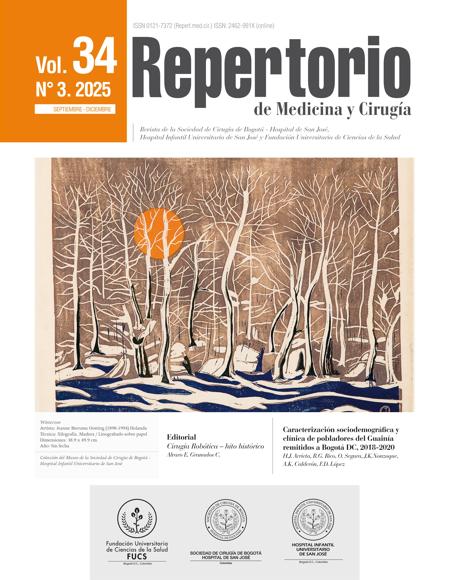Sleep quality among frontline healthcare workers during the COVID-19 pandemic in the Colombian Caribbean region
Calidad del sueño en trabajadores de la salud que atendieron en pandemia de Covid 19 en el caribe colombiano
![]()
![]()

Show authors biography
Introduction: in the age segmentation of the elderly, sleep disorders have become one of the most prevalent health problems in the contemporary world upon reaching middle age. Several studies have demonstrated a high rate of sleep disorders among healthcare workers. During the recent pandemic, these workers were negatively affected posing serious repercussions on their general health. Objective: to describe sleep quality and hygiene, among healthcare workers in the Colombian Caribbean region, during the third 2021 pandemic peak. Materials and Methods: a descriptive, observational study in a population of 220 healthcare workers who worked in hospitals and clinics in the Colombian Caribbean region, between January and March 2021, during the third pandemic peak. The Pittsburgh Sleep Quality Index (PSQI) validated in Colombia, was used, with adaptations to sociodemographic data. Results: most participants were between 20 to 30 years of age (47.27%), 67.63% were females, 28.64% had professional nursing training and 33.64% had nursing assistant training. In terms of perception, 55.5% of respondents reported having poor sleep quality. According to the global PSQI which measures sleep quality, 60% (130) were poor sleepers. Conclusions: according to the results, many healthcare workers, especially nurses and assistant nurses, evidenced sleep quality deficiencies. Programs should be developed, to improve night shift workers well-being.
Article visits 490 | PDF visits 269
Downloads
- García López V. "El trabajo y los otros efectos letales de la falta de sueño. Anales Sis San de Navarra. 2019;42(3):357-359. https:// dx.doi.org/10.23938/assn.0724
- Reyes Vega AM, Huailas Suquilanda WA, Naranjo Romero RR, Álvarez Marín MG, et al. Cambios cardiometabólicos en trabajadores del área de la salud: papel de la disrupción del sueño. Revista Latinoamericana de Hipertension. 2019;14(2):230-236.
- Brooks SK, Webster RK, Smith LE, Woodland L, Wessely S, Greenberg N, Rubin GJ. The psychological impact of quarantine and how to reduce it: rapid review of the evidence. Lancet. 2020;395(10227):912-920. https://dx.doi.org/10.1016/S0140- 6736(20)30460-8
- Cataño Jaramillo DM, Oquendo Mejía D. Ocurrencia del síndrome post cuidados intensivos (PICS) y la afectación en la calidad de vida de los pacientes [Tesis]. Medellín: Universidad de Antioquia; 2021.
- Brooks SK, Dunn R, Amlot R, Rubin GJ, Greenberg N. A Systematic, Thematic Review of Social and Occupational Factors Associated with Psychological Outcomes in Healthcare Employees during an Infectious Disease Outbreak. J Occup Environ Med. 2018;60(3):248– 57. https://dx.doi.org/10.1097/JOM.0000000000001235
- Qi J, Xu J, Li BZ, Huang SJ, et al. The evaluation of sleep disturbances for Chinese frontline medical workers under the outbreak of COVID-19. Sleep Med. 2020;72:1-4. https://dx.doi.org/10.1016/j. sleep.2020.05.023
- Abdoli N, Farnia V, Jahangiri S, Radmehr F, Alikhani M, Adboli P, Brand S. Sources of Sleep Disturbances and Psychological Strain for Hospital Staff Working during the COVID-19 Pandemic. Int J Environ Res Public Health. 2021;18(12):6289. https://doi.org/10.3390/ijerph18126289
- Gualano MR, Lo Moro G, Voglino G, Bert F, Siliquini R. Effects of Covid-19 Lockdown on Mental Health and Sleep Disturbances in Italy. Int J Environ Res Public Health. 2020;17(13):4779. https://doi.org/10.3390/ijerph17134779
- Sacasqui Miranda JR. Prevalencia y factores asociados a trastornos del sueño en personal técnico de enfermería del Hospital Goyeneche, Arequipa 2018 [Tesis]. Perú: Universidad Nacional de San Agustín de Arequipa; 2018.
- Satizábal Moreno JP, Marín Ariza DA. Calidad de sueño del personal de enfermería. Rev. Cienc. Salud. 2018;16(especial):75-86. https://doi.org/10.12804/revistas.urosario.edu.co/revsalud/a.6846
- Escobar-Córdoba F, Eslava-Schmalbach J. Validación Colombiana del 21 Índice de Calidad de Sueño de Pittsburgh. Rev Neurol. 2005;40(3):150–5. https://doi.org/10.33588/rn.4003.2004320
- Falla L. Relación entre la calidad del sueño y la calidad de vida del personal de salud en una institución de salud de IV nivel en Caracas 2016 [Tesis]. Bogotá: Universidad del Rosario, 2016.
- Massobrio M, Vizioli NA. Ansiedad y calidad de sueño en población general y trabajadores sanitarios en situación de pandemia. Cuadernos de la Facultad de Humanidades y Ciencias Sociales. Cuad Fac Humanid Cienc Soc, Univ Nac Jujuy. 2021;60:269-290.
- Valiensi SM, Folgueira AL, Enriz NM, Garay ADC, Giardino DL. Análisis de la calidad del sueño, alteraciones del humor y modificaciones de algunos hábitos y conductas durante dos diferentes períodos de la pandemia por COVID-19 en Argentina. Vertex Rev Arg Psiquiatr. 2022;33(157):23-33. https://doi.org/10.53680/vertex.v33i157.270












